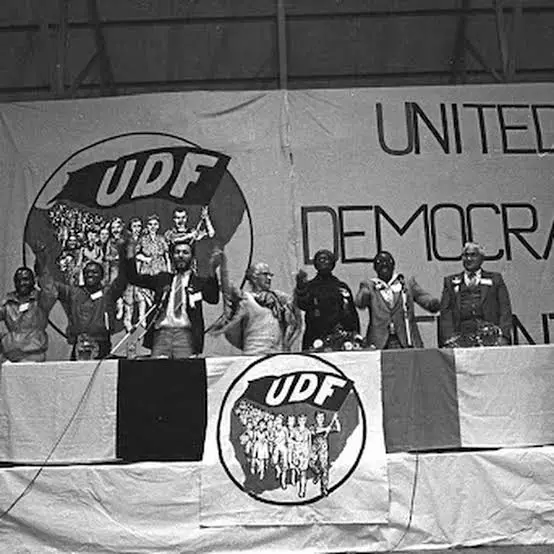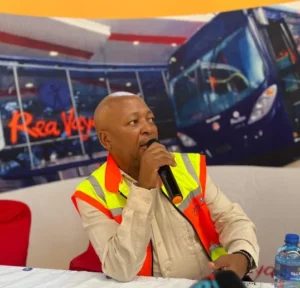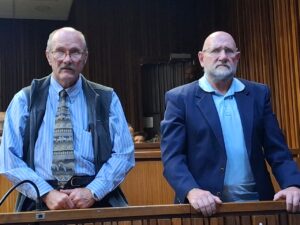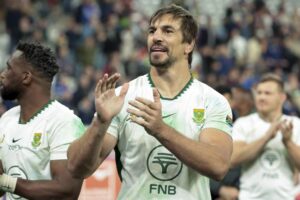By: Allan Boesak
My dear Brother Popo,
My sincere apologies for responding only now to your invitation to join your group “UDF40” in your commemoration of the UDF and your “Call to Action” on August 20. Thank you very much for the invitation and for your patience. You honour me by inviting me to be a part of this event, which under different circumstances would have brought great joy to my heart. You and I had been comrades in the UDF, and shared so much of the dreams and hopes of our people, in those extraordinary times. I will, in return, honour you by trying to be as honest as I can. I am writing this letter, rather than talk on the telephone, so that I can be as clear as possible, and there would be no misunderstanding on why I will not be joining you in this effort, and in your celebrations of the UDF on August 20.
Since our last conversation I wanted not only to read and reflect on your document but also consult as widely as possible as I travelled the country and joined discussions and UDF commemorations. I did so not only because it is proper and the right thing to do, but also because over the last few years I have been very vocal in my views on the state of the nation, our politics and the plight of our people under the ANC government. I have noted the reaction of people whenever I spoke, so I know there is almost complete consensus on these matters and the utter failure of the ANC to give meaning to our democracy. An invitation from the Youth Desk of the Uniting Presbyterian Church in Southern Africa on March 21 to speak to their youth on the topic, “The Plight of Our Democracy: What Have We Lost?” just about sums it up. What I wanted to do this time was to get confirmation on my views about this commemoration year and specifically the plans you and your group have for the “action” you envisage.

Across the country, there is virtually no disagreement on what South Africans are facing right now as a result of governmental mismanagement over thirty years, that something needs to be done urgently, and that our people need to be united and inspired toward action. However, I have been confirmed in my instinctive hesitation about the group you represent. That is the group you yourself have identified as the so-called “Defend our Democracy” group. In theory, I find little fault with your analysis of our situation. It is indeed as dire as you describe it in that very well-written document. So the problem is not so much the “what”, or the “how?” It is the “who”.
Like just about everyone else, I have been deeply concerned about the open factionalism in the ANC, the divisionism it causes, and the toxic effect of it on our politics. This is one of the reasons why I, over the last two years or so, have consistently declined every invitation from that group to speak at their public meetings. I did not want to be associated with any faction in the ANC – not then, and not now.
I declined those invitations also because I found that while “Defend our Democracy” was very vocal in their condemnation of former President Jacob Zuma, and rightly so, they were curiously quiet when President Cyril Ramaphosa’s questionable actions began to surface. I was already disturbed when Mr Ramaphosa blandly began to speak of “nine wasted years” under Zuma when, in fact, he was right there, as Deputy President, and as Chair of the Deployment Committee, to say nothing of his role vis-à-vis oversight of the State Enterprises. That refusal to take any responsibility at all, while the ANC is so obsessed with “collective decision making” when it suits them, is a political Pontius Pilate washing-of-the-hands attitude that has now become disastrously ingrained in the ANC. It is a prime example of the pseudo-innocence I talked about already in 1976: the feigning of ignorance while reaping the benefits of abusive power and systemic injustice. It is the fig leaf for political chicanery and moral recklessness that is the open door to that impunity that have destroyed our people’s trust in our democratic institutions from parliament to the courts. No wonder his was a “dawn” where the sun never rose.
Yet through all this, in scandal after scandal, “Defend our Democracy” did not say a word. Certainly no word that the South African public could hear, that could clear away the fog. Not even with, for the country deeply humiliating allegations of the hidden monies surfacing, and with the Ngcobo Commission stating clearly that the President has a case to answer. With that scandalous vote in Parliament I still did not hear a word, saw no call for accountability, or responsibility, certainly no call for public protest action. Was our democracy not then, as it is still now, under severe attack? Those who tried to do their constitutional duty were either publicly debased, intimidated, or suspended. Still, not a word. There are few things so detrimental to the health of a democracy as selective indignation.
It is no wonder, though incredibly disheartening, that there is such regular talk about the “Thuma Mina Faction” and the “Umshini Wami Faction.” And these are, I hear, not the only factions. It looks to me that you were not so much defending our democracy as defending Cyril. That is not about principle. It is about personal political and economic gain. In fact, sometimes I was severely criticised by those in your circle because I was so publicly critical of the ANC government. I have not heard anyone of you say what every conscientious South African knows is so absolutely necessary. Not just that Cyril Ramaphosa has to go, but that the ANC as a whole is enveloped by a culture that has put it beyond redemption; that in fact, the whole system chosen for our people in your secret talks with the old apartheid white capitalist class, is rotten to the core. Like apartheid, it cannot be reformed, it has to be irrevocably eradicated. I said this in 1983. It is even more true today.
But also, my Brother, as I look through the names you mention and names I know in this faction, I recognise those who, when the ANC with such unseemly haste decided to demolish the UDF, were singing loudest in that choir. I remember who they sent to me to convince me of the political rightness of that decision, how I refused, until they sent Madiba, under whose weight I eventually crumbled – a moment I still deeply regret. But they supported that position, because it would prove to be so rewarding. It is only a few weeks ago that I heard, for the first time after all these years, that the funeral of the UDF in Mitchell’s Plain was followed by a celebration party in the old Carlton Hotel. How fitting, and how ineffably sad. So I have to ask myself, are these the same people who are now calling for the revival of the UDF?
Moreover, in these decades of ANC rule, many of those persons have taken governmental responsibility at one level or another, made decisions about policy to the detriment of the vast majority of our people. They have gained position, privileges and riches beyond imagination over these last thirty years, including those nine dark years. The darkness did not matter, as long as the bank accounts were swelling. Many of us came to the conclusion that these were efforts, not to defend our democracy, but their faction’s version of the ANC instead, and to protect the president, from whose favour so many blessings flow, in the process shamelessly exploiting, and betraying, the trust of the people, spitting upon their sacrifices.
Now, however, it seems that the game is up. The ANC can no longer hide the fact that it is a factionalised, paralysed party, mesmerised by greed, and hypnotised by its own delusions, chief of which is the myth that it can “correct itself.” But, as the Bible says, “Your sins will find you out.” As the 2024 elections draw near, the ANC has not only run out of ideas, or courage, or vision. It has outrun its nobility, in the process leaving the people behind, as in the picture drawn by the prophet Isaiah, almost three thousand years ago: “We grope like the blind along a wall … we stumble at noon as in the twilight…” All because “justice is far from us.”
For there was a time in South Africa forty years ago, when faith communities and educational institutions, universities and high schools, lecturers and students, workers and the unemployed, people from all walks of life, across the artificial barriers of skin colour, race, class, culture, religion, and language came together. We saw the world of apartheid through the eyes of those who suffered, and we rose up in resistance. Our protest was relentless and purposeful, and not in any way, as Adam Small cautioned us, a form of begging.
We faced tear gas, and dogs, and guns. We were imprisoned, beaten, and tortured. We lived lives of self-sacrifice. We lived in selfless, revolutionary reciprocity. We felt the pain of our people, and we shared their dreams of freedom. Through their eyes, we saw visions of justice and equity. We knew, absolutely, that we were not a people meant for oppression, and tyranny, and destruction. You know this; you were there. That was the spirit of the UDF. Our non-racialism was not a slogan; it was real, experiential, a living guiding principle for our every action. That is what African American scholar/activist WEB DuBois called “the politics of honesty, decency, integrity, courage, and virtue.”
But that was before the days of euphoria and illusion. Before we told ourselves that a negotiated settlement signified the coming of the reign of God. Before we decided that honouring our people’s sacrifices was too much of a hindrance to the profitable deals made with the old white, apartheid, capitalist class. Before we were so mesmerised by the wizardry of Mammon and the intoxications of power that we forgot the subversive memories of struggle. That was before we began to use parliamentary privilege to disguise our crimes, turning the people’s House into a refuge for scoundrels. Before we left the battlefields of justice to hide ourselves in the draughty caves of kleptocracy, self-aggrandizement and instant gratification.
It is no wonder that we ended up where we are today, as a country, and as a people. We are a people severely diminished by politics without principles, leadership without vision, policies without commitment, and hence by failure after failure. We are drowning in corruption, and lies, and cover-ups. We are plagued by deceit and confounded by subterfuge. Our disastrous choices for neo-liberal capitalist economic policies have deepened the generational impoverishment of our people while creating new millionaires every second week it seems, by some crooked scheme or another, making us the most unequal society in the world today.
In 1985, in those state-of-emergency days, I made a poster of the words of African Church Father Augustine. ”A government that does not know justice is no more than a gang of robbers.” That was as true in the 5th century as it was in the 20th. It is as true now, in the 21st, under Cyril Ramaphosa and the ANC. We are indeed ruled by a gang of robbers.
So now, some in the ANC realise the enormity of that mistake, for that is the “spirit of the UDF” you are now all looking for. That, however, is the very spirit you have tried to banish, thirty two years ago. That is why there are some now regurgitating (in my presence!) the false claim that the UDF was, in actual fact, the “internal wing” of the ANC, its own child, so to speak. I find that repetition of the old National Party propaganda trope unspeakably cynical, for what does it make you when you are the one who killed your own child? And can people, who never speak of miracles, but rather of “the balance of forces” and their own cleverness, now claim to believe in something miraculous like a resurrection?
But even more importantly, a spirit has to find a home. I do not believe that the spirit of the UDF will find a home in the ANC as it is today. That spirit is indeed desperately needed, but it has to find a home within the people, like in 1983, from all walks of life, across the boundaries of race, pigmentation, religion, language and culture, and like in 1983, outside of institutionalised politics. Not connected to a factionalised, self-centered, vote-seeking but not people-serving political organisation that since its return has been smothering every possibility for a just, equitable, inclusive, truly non-racial, democratic society, when it reintroduced those despised apartheid racial categories that we had so marvellously overcome in the Black Consciousness Movement and in the UDF. Even to this day, with its new Employment Equity Amendment Act. Despite the clumsy gymnastics, so-called coloured people know exactly what that means. They have experienced it from the first mention of affirmative action, from denying and erasing their role in the struggle to pretending that they abandoned the ANC as soon as 1994 dawned. But they were at the heart and soul of the UDF and they don’t forget. Our people on the Cape Flats and in the far platteland may not be powerful and many are not highly educated, but they are not stupid.
As you can imagine, everywhere I go these days there are people reminding me of my speech at the launch. You’ve seen the clips going around, I’m sure. So I went back to remind myself of some of my words. Please indulge me if I repeat them here, for you and me both, since for me, they have remained a kind of pledge. “This country is our country, and its future is not safe in the hands of people – white or black – who despise democracy and trample on the rights of the people. Its future is not safe in the hands of people – white or black – who depend upon economic exploitation and human degradation to build their empires. Its future is not safe in the hands of people – white or black – who need the flimsy and deceitful cloak of ethnic superiority to cover the nakedness of their racism. Its future is not safe in the hands of people – white or black – who seek to secure their unjustly required positions by violent repression of the weak, the exploited and the needy. Its future is not safe in the hands of people – white or black – who put their faith simply in the madness of growing militarism. So for the sake of our country and our children, whether you be white or black, resist those people, whether they be white or black.” That’s exactly where we are today, and that is what I am still trying to do, as faithfully as I can.
As far as I could determine, you have not been able to convince the people as a whole that your agenda is anything but an effort to give life, credibility, and authenticity to the ANC, floundering in the stormy seas of its own hubris. At this point, we are perhaps not yet able to create the kind of society we were fighting for, but we certainly are at the point where we can try to stop the damage being done to our dreams of democracy. The carnage has to stop, and this is wat we are fighting for. I cherish the memory of the UDF, and I would love to see its spirit rekindled and re-invited to invigorate our people, to see our country experience real, lasting, and durable transformation, but then it must be real. A traumatised people can only take so much.
Our people are starving for justice, hungering for the fulfilment of all those promises made, thirsting for hope they are almost completely deprived of, longing for a sign that all is not lost. So no doubt, many will be there on August 20, desperately hoping that this time it will be real, that this time they will not be lied to. I will not be in that number, I’m afraid. For me, the memory of the UDF – the amazing work it had done, the courage and power of the people’s convictions and faith, their self-sacrificial love for our country lived out on those streets of deadly confrontation day after day and not betrayed even in the darkest hours of their pain – is too precious. If democracy is no more than the people lining up to vote every five years so that crooked politicians can line their pockets for the next five years – what kind of democracy is that?
Our people cannot be at home in an organisation that we loved and entrusted our power to, and that now leaves us at the ballot box, wondering why we have to choose between the lesser of multiple evils, instead of securing and consolidating our freedom. I say this because, at this moment, I have very little faith in other political parties as an alternative. Meanwhile, there is all this talk about “the grand coalition” with the DA. Desperation makes for strange bedfellows, but perhaps there is something more sinister afoot. Nonetheless, that will be a disaster, not only because the DA, where it governs, has a better record than the ANC, and with the ANC’s weak leadership will be the senior partner, whichever way one looks at it; but primarily in my view, because the DA is the most successful neo-colonialist project on the continent. Our downslide into neo-liberalist capitalist chaos will only continue, to the detriment of the vast majority our people.
So they forego this precious right, and stay home at election time in those disturbing numbers. I mean that hopeful sizwe who remember what it is we fought, struggled, suffered and what so many died for, and whose cry for the return of spirit of the UDF is entirely legitimate and will surely be heard as it echoes from heart to heart. Those people are our people, and in this present darkness, they will search for that bright light of justice, freedom, and the respect that honours their dignity until they find it. They are our people, robbed of their voices and their agency in the last thirty years, but not of their purpose and revolutionary destiny, and they will rise, I promise you.
So it pains me to say that for all these reasons, and more that I will not discuss here my dear Brother, I will not be joining you. But thank you for doing me the courtesy of inviting me.
Sincerely and with warm regards









If I may alter the name of Alan Paton’s famous book as my comment:
“Cry, for the Beloved Country”
My heart weeps for what could have been!
Your point of view caught my eye and was very interesting. Thanks. I have a question for you.